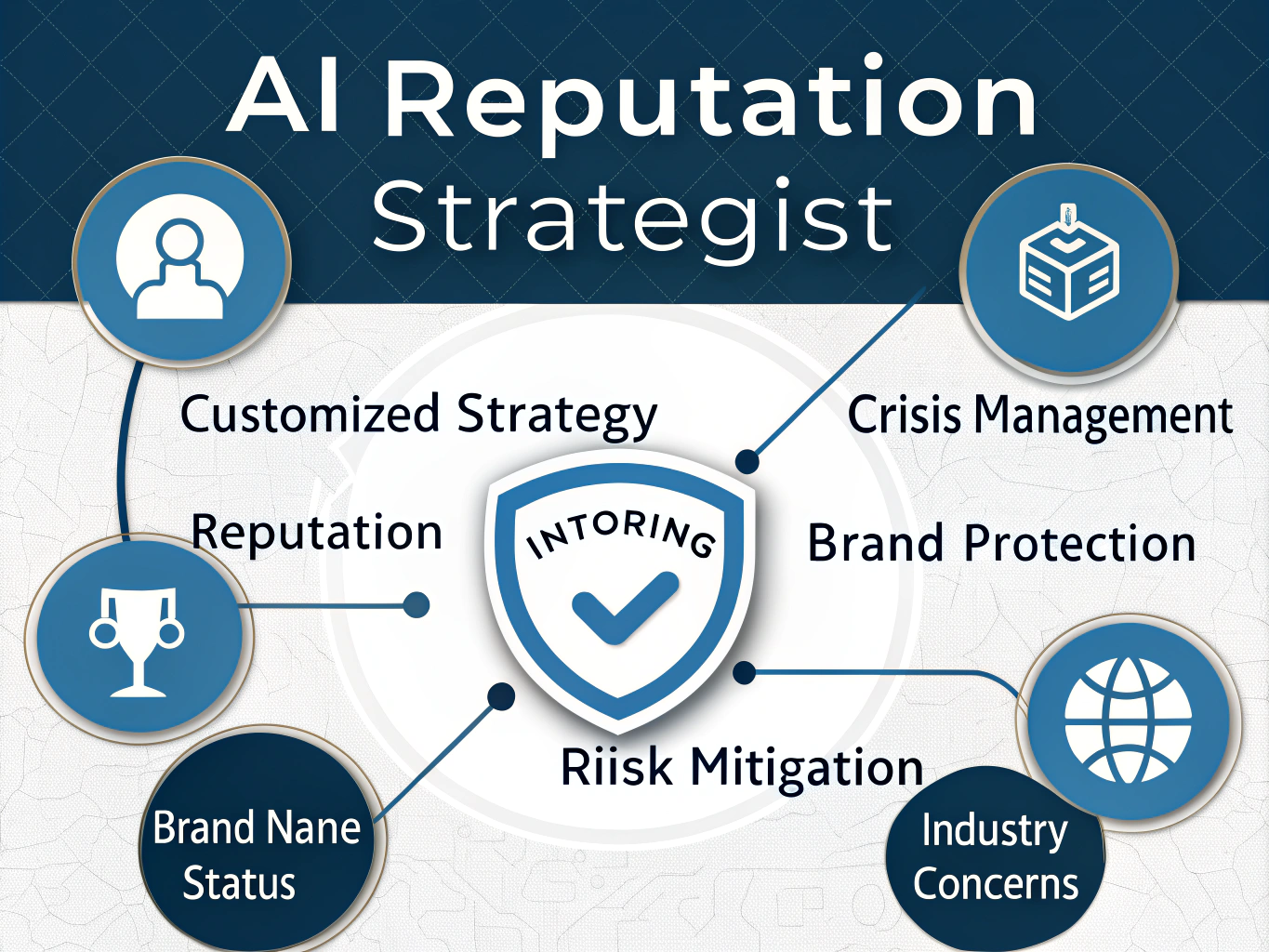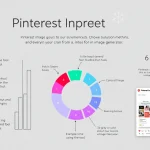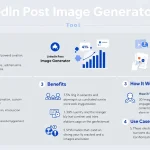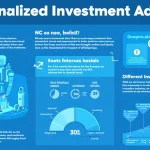AI Reputation Strategist
Is this tool helpful?
How to Use the AI Reputation Strategist Tool Effectively
The AI Reputation Strategist tool is designed to provide expert guidance on safeguarding and enhancing a brand’s reputation for PR agencies and brands. To use this tool effectively, follow these steps:
- Enter the brand name: In the “Name of the brand or company” field, input the name of the organization you’re focusing on. For example, you might enter “GreenTech Solutions” or “Harmony Health Foods”.
- Specify the industry: In the “Industry or sector the brand operates in” field, provide the relevant industry. Examples could be “Sustainable Energy” or “Organic Food Retail”.
- Describe current reputation status (optional): If applicable, use the “Brief description of the brand’s current reputation status” field to give context. For instance, “Strong environmental initiatives, but facing challenges with supply chain transparency”.
- List specific concerns (optional): In the “Any specific reputation concerns or challenges” field, detail any particular issues. An example could be “Recent allegations of greenwashing in marketing campaigns”.
- Generate the strategy: Click the “Generate Reputation Management Strategy” button to receive tailored recommendations.
- Review and implement: Carefully read through the generated strategy, considering how to apply the suggestions to your specific situation.
By providing accurate and detailed information, you’ll receive a more targeted and effective reputation management strategy.
Understanding the AI Reputation Strategist Tool: Definition, Purpose, and Benefits
The AI Reputation Strategist tool is an innovative solution designed to assist PR agencies and brands in navigating the complex landscape of reputation management. By leveraging artificial intelligence, this tool provides tailored strategies and insights to protect and enhance a brand’s public image.
Definition and Purpose
At its core, the AI Reputation Strategist is a sophisticated algorithm that analyzes input about a brand’s current reputation status, industry context, and specific challenges. Its primary purpose is to generate comprehensive, actionable strategies for reputation management, crisis prevention, and positive image cultivation.
Key Features
- Customized strategy generation based on brand-specific information
- Proactive reputation management techniques
- Crisis response planning and execution guidance
- Recommendations for reputation monitoring tools and techniques
- Strategies for building and maintaining a positive public image
- Insights on leveraging transparency and authenticity in communication
Benefits of Using the AI Reputation Strategist Tool
Implementing the AI Reputation Strategist tool in your PR and brand management efforts can yield numerous benefits:
- Time and Resource Efficiency: By quickly generating tailored strategies, the tool saves valuable time that would otherwise be spent on manual research and strategy development.
- Comprehensive Approach: The tool considers multiple facets of reputation management, ensuring a holistic strategy that addresses various aspects of brand perception.
- Proactive Risk Mitigation: By identifying potential reputation risks early, brands can take preventive measures before issues escalate.
- Crisis Preparedness: The tool provides guidance on handling negative publicity, enabling brands to respond swiftly and effectively during crises.
- Continuous Improvement: Regular use of the tool allows brands to adapt their reputation management strategies as market conditions and public perceptions evolve.
- Data-Driven Decision Making: The AI-powered recommendations are based on analyzed data and best practices, leading to more informed strategic decisions.
- Competitive Edge: By staying ahead in reputation management, brands can differentiate themselves from competitors and build stronger relationships with stakeholders.
Addressing User Needs and Solving Specific Problems
The AI Reputation Strategist tool is designed to address a wide range of reputation management challenges faced by PR agencies and brands. Let’s explore how it tackles specific problems:
1. Proactive Reputation Management
Problem: Many brands struggle to maintain a positive reputation proactively, often reacting to issues as they arise rather than preventing them.
Solution: The tool provides strategies for proactive reputation management, such as:
- Developing a consistent brand voice across all communication channels
- Creating a robust corporate social responsibility (CSR) program
- Implementing employee advocacy initiatives to boost brand perception
- Regularly engaging with stakeholders through transparent communication
Example: For a tech company facing concerns about data privacy, the tool might suggest:
“Implement a ‘Privacy First’ initiative, including regular third-party audits of data handling practices, transparent reporting of data usage to customers, and a series of educational webinars on data security for stakeholders.”
2. Crisis Management and Negative Publicity Handling
Problem: When faced with a reputation crisis, many organizations struggle to respond effectively, often exacerbating the situation.
Solution: The AI Reputation Strategist provides guidance on crisis management, including:
- Developing a crisis communication plan
- Training spokespersons for media interactions during crises
- Crafting appropriate messaging for different stakeholder groups
- Utilizing social media effectively for crisis communication
Example: For a food company facing allegations of contamination, the tool might recommend:
“Immediately issue a clear, factual statement acknowledging the concern. Initiate a voluntary recall of potentially affected products. Launch a dedicated hotline and website for customer inquiries. Conduct and publicize rigorous testing processes. Share regular updates on the investigation and corrective measures taken.”
3. Reputation Monitoring and Assessment
Problem: Brands often lack effective systems to monitor and assess their reputation across various platforms and media.
Solution: The tool recommends monitoring techniques and tools, such as:
- Implementing social listening tools to track brand mentions and sentiment
- Conducting regular stakeholder surveys to gauge perception
- Utilizing media monitoring services for comprehensive coverage analysis
- Developing key performance indicators (KPIs) for reputation measurement
Example: For a retail brand looking to improve its online reputation, the tool might suggest:
“Implement a robust social listening strategy using tools like Brandwatch or Mention to track brand sentiment across social media platforms. Set up Google Alerts for real-time notifications of brand mentions in news articles. Conduct quarterly Net Promoter Score (NPS) surveys among customers to measure brand loyalty and satisfaction.”
4. Building and Maintaining a Positive Public Image
Problem: Organizations often struggle to consistently project a positive image that resonates with their target audience.
Solution: The AI Reputation Strategist offers strategies for image enhancement, including:
- Developing a strong brand narrative and values proposition
- Creating thought leadership content to establish industry expertise
- Implementing community engagement initiatives
- Leveraging influencer partnerships to boost brand credibility
Example: For a B2B software company aiming to enhance its industry standing, the tool might recommend:
“Launch a quarterly industry trends report showcasing your company’s expertise. Develop a ‘Tech for Good’ program, partnering with non-profits to provide pro-bono services. Encourage C-suite executives to participate in high-profile industry panels and conferences. Implement an employee volunteer program, allowing staff to contribute their skills to community projects.”
5. Leveraging Transparency and Authenticity
Problem: Many brands struggle to balance transparency with protecting sensitive information, often coming across as inauthentic or secretive.
Solution: The tool provides guidance on implementing transparency and authenticity in communication:
- Developing clear guidelines for what information can be shared publicly
- Creating behind-the-scenes content to showcase company culture and processes
- Implementing regular stakeholder Q&A sessions or town halls
- Addressing mistakes or shortcomings openly and proactively
Example: For a pharmaceutical company looking to improve public trust, the tool might suggest:
“Launch a ‘Clinical Trials Transparency Initiative,’ providing easy-to-understand summaries of all trial results, both positive and negative. Create a series of short documentaries showcasing the drug development process, from research to approval. Implement a public advisory board including patients and healthcare professionals to provide input on key decisions.”
Practical Applications and Use Cases
The AI Reputation Strategist tool can be applied in various scenarios across different industries. Here are some practical use cases illustrating its versatility:
1. Tech Startup Facing Rapid Growth
Scenario: A fast-growing tech startup is experiencing challenges maintaining its reputation as it scales rapidly.
Application: The AI Reputation Strategist could provide strategies for:
- Maintaining company culture and values during rapid expansion
- Managing increased public scrutiny and media attention
- Addressing potential concerns about data privacy and security
- Balancing innovation messaging with responsible growth narratives
Outcome: The startup successfully navigates its growth phase while maintaining a positive public image and stakeholder trust.
2. Global Consumer Brand Launching in a New Market
Scenario: A well-established consumer brand is entering a new geographical market with different cultural norms and consumer expectations.
Application: The tool could offer guidance on:
- Conducting cultural sensitivity audits of marketing materials
- Developing localized CSR initiatives to build community goodwill
- Creating crisis management plans tailored to the new market’s media landscape
- Identifying and engaging with local influencers and opinion leaders
Outcome: The brand successfully establishes a positive reputation in the new market, avoiding cultural missteps and building strong local relationships.
3. Healthcare Provider Navigating a Public Health Crisis
Scenario: A healthcare provider is at the forefront of managing a public health crisis, facing intense scrutiny and pressure.
Application: The AI Reputation Strategist might recommend:
- Developing a crisis communication hub for real-time updates
- Creating educational content to combat misinformation
- Implementing transparent reporting on resource allocation and patient care
- Showcasing staff stories to humanize the organization’s efforts
Outcome: The healthcare provider emerges as a trusted authority during the crisis, strengthening its long-term reputation.
4. Financial Institution Recovering from a Data Breach
Scenario: A bank has experienced a significant data breach, impacting customer trust and financial stability.
Application: The tool could provide strategies for:
- Immediate and transparent communication with affected customers
- Developing a comprehensive security overhaul plan
- Creating a customer compensation and protection program
- Rebuilding trust through enhanced transparency and regular security updates
Outcome: The bank successfully mitigates the impact of the breach, rebuilds customer trust, and implements industry-leading security measures.
5. Sustainable Fashion Brand Addressing Supply Chain Concerns
Scenario: An eco-friendly fashion brand faces allegations of unsustainable practices in its supply chain.
Application: The AI Reputation Strategist might suggest:
- Conducting and publishing a third-party audit of the entire supply chain
- Developing a transparent supplier code of conduct
- Implementing blockchain technology for supply chain traceability
- Launching an educational campaign on sustainable fashion practices
Outcome: The brand transforms the challenge into an opportunity, becoming an industry leader in supply chain transparency and sustainable practices.
Frequently Asked Questions (FAQ)
Q1: How often should I use the AI Reputation Strategist tool?
A1: It’s recommended to use the tool quarterly for routine reputation management and immediately when facing specific challenges or crises. Regular use helps in staying proactive and adapting strategies as your brand evolves.
Q2: Can the tool replace human PR professionals?
A2: No, the AI Reputation Strategist is designed to complement human expertise, not replace it. It provides data-driven insights and recommendations, but human judgment is crucial for interpreting results and implementing strategies effectively.
Q3: How does the tool stay updated with the latest PR trends and best practices?
A3: The AI Reputation Strategist is regularly updated with the latest industry trends, case studies, and best practices. However, it’s always beneficial to combine the tool’s insights with ongoing professional development and industry networking.
Q4: Can the tool be customized for specific industries or company sizes?
A4: Yes, the tool considers industry-specific factors and company size when generating recommendations. By providing detailed information about your brand and industry, you’ll receive more tailored strategies.
Q5: How does the tool handle multi-brand corporations?
A5: For multi-brand corporations, it’s best to use the tool separately for each brand, as reputation management strategies may differ. However, you can also input overarching corporate information to receive strategies for managing the overall corporate reputation.
Q6: Can the tool help with personal branding for executives?
A6: While primarily designed for corporate branding, many strategies provided by the tool can be adapted for personal branding. Consider using it to develop thought leadership and public engagement strategies for key executives.
Q7: How does the tool address industry-specific regulations in its recommendations?
A7: The AI Reputation Strategist considers general regulatory environments, but it’s crucial to review all recommendations against specific industry regulations. Always consult with legal experts when implementing reputation management strategies in highly regulated industries.
Q8: Can the tool help manage online reviews and ratings?
A8: Yes, the tool provides strategies for managing online reputation, including handling reviews and ratings. It offers guidance on responding to feedback, encouraging positive reviews, and addressing negative comments constructively.
Q9: How does the tool handle reputation management across different cultural contexts?
A9: The AI Reputation Strategist considers cultural factors when provided in the input. For global brands, it’s advisable to use the tool multiple times with specific cultural contexts to receive tailored strategies for different regions.
Q10: Can the tool help in measuring the ROI of reputation management efforts?
A10: While the tool doesn’t directly calculate ROI, it provides recommendations for KPIs and measurement techniques. These can be used to track the effectiveness of your reputation management efforts and calculate ROI over time.
Important Disclaimer
The calculations, results, and content provided by our tools are not guaranteed to be accurate, complete, or reliable. Users are responsible for verifying and interpreting the results. Our content and tools may contain errors, biases, or inconsistencies. We reserve the right to save inputs and outputs from our tools for the purposes of error debugging, bias identification, and performance improvement. External companies providing AI models used in our tools may also save and process data in accordance with their own policies. By using our tools, you consent to this data collection and processing. We reserve the right to limit the usage of our tools based on current usability factors. By using our tools, you acknowledge that you have read, understood, and agreed to this disclaimer. You accept the inherent risks and limitations associated with the use of our tools and services.







